
PUMPA - SMART LEARNING
எங்கள் ஆசிரியர்களுடன் 1-ஆன்-1 ஆலோசனை நேரத்தைப் பெறுங்கள். டாப்பர் ஆவதற்கு நாங்கள் பயிற்சி அளிப்போம்
Book Free DemoThe narrator begins by explaining to the readers that the text is going to deal with his wife's pet sloth bear. He recounts the day of the incident when he first met the pet bear. He creates an air of suspense as he says that he got the bear by accident. The story then moves on to open a flashback episode, that picturizes a sugarcane field in Mysore. Generally, fields and farmland are attacked by wild boars, pigs and elephants from the neighbouring jungles. Similarly, the narrator encounters a group of people driving away wild pigs that had come to attack and feed on the sugarcanes. Wild pigs or wild boars can be a huge threat to farmlands as they trample and destroy the plantations and crops. They adopted a mean technique to drive them away. Since they were also scared of being attacked by the wild pigs, they chose to shoot them down. While people use solar lights and fencing in the modern age, there was not much of an alternative to keep the wild pigs away for farmers in the pre-Independence days. It was a time when hunting was legal in India and many men took it as a sport. Some pigs were shot and some escaped by running. When everything was settled with the pigs, the narrator notices a black sloth bear emerging from the field, panting under the hot sun. The bear must have hidden hearing the commotion, and when it resurfaced, it happened to be noticed by the people.
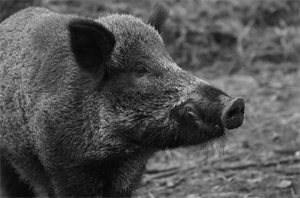
Wild pig
The narrator makes it clear to his readers that he would never shoot a bear on purpose. But his companions do not share his compassion and therefore shoots the poor beast. The companions could have shot the bear out of fear of being attacked or even for the sake of sport and fun. But a series of incidents unfold after the shot. The bear falls down lying facing downwards and has a small patch of black fur on its back. They were surprised to find the black fur moving from the dead bear's body. It was the cub of the bear who had clung on to its mother's body tightly during the time of the shooting. The bear had in fact tried to rescue its cub from the shooting. A pathetic scene enfolds as the cub, not being aware of what had happened, runs around his dead mother's body without a clue. He makes a pitiful noise when he runs, showing that he could sense that something was wrong. He is in a state of confusion amidst the chaos.
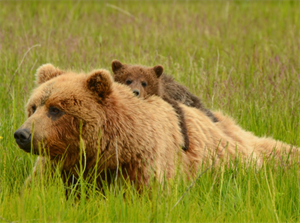
Bear cub clinging on the back of the bear
The narrator runs behind the cub in a hopeless attempt to catch it. In spite of the fact that the cub had to experience a series of torture, he is subjected to more by driving him around the field. In the narrator's perspective, he is trying to protect the cub by capturing it and giving proper care. But he does not realize that the cub's place belongs in the wild. He somehow manages to capture him along with his companions. He drives him in and around the sugarcane field since the cub tries to escape. He holds it by the back of his neck along with his collar. The bear in spite of being a cub, does its best to snap out of his hands. His inborn nature is brought out when faced with a difficult situation. He tries to scratch the narrator's hands with his hooked claws to try and escape. He was put in a gunny-bag, and taken to his home back in Bangalore. The cub was gifted to his wife, who was delighted to have a bear for a pet. The process of taming the bear starts from this moment as a red ribbon is tied around his neck and he is christened with a name ' Bruno'.
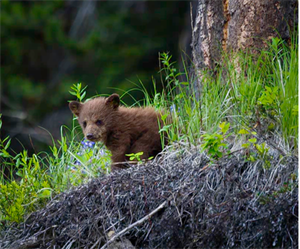
A bear cub in the field
Bruno's diet is strange as the narrator explains it. Unlike the wild bear cubs which are left to fend for themselves, in the wilderness, food is readily available for Bruno. His hunting instincts are not brought out. Instead, he is given milk in a feeding bottle. The same humans who shot his mother, thereby refraining him from being in the wilderness., provide him milk and nutrients. But as days pass, the bear totally comes away from his roots. A bear which normally eats meat, fruits and honey, goes about drinking aerated drinks, beer, tea, coffee and even alcohol. As for food, he eats fruits, vegetables, nuts, meat along with chocolates, ice creams, sweets, chillies, not pertaining to a particular diet but rather eating anything that comes along his way. He enjoyed eating everything.
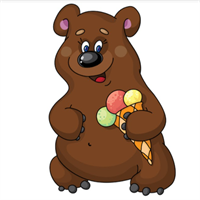
Bear eating ice cream
The bear cub adapts to the new environment and home by making friends. Since he was taken in at a very young age, it is easy for him to mingle with everyone, as he still has not been exposed to the wild. He establishes a cordial relationship with the other tamed animals of the house, which includes two Alsatian dogs. He is also not a threat to the children of the narrator's neighbours who lived in the same bungalow. Nobody considers him dangerous as he is left to wander around and even sleep on the narrator's bed, since he was merely a cub.
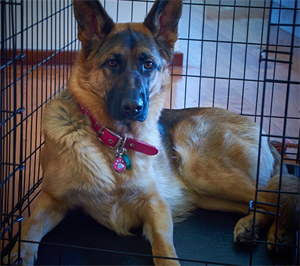
Alsatian dog
The narrator explains about a horrible accident that Bruno encountered as a cub. He had placed poison ( Barium Carbonate) in his library to kill the mice and rats that destroy and chew his books. Barium directly stimulates all types of muscles, including cardiac muscle, and causes a profound reduction in one's body. It is a poisonous chemical that has harmful side effects. The bear, upon entering the library, and having the habit of eating anything and everything, sees the barium carbonate. Considering it as an eatable, he gobbles it up, giving him immediate paralysis in his body. Since the barium influences the cardiac muscle, the major thriving factor of one's body, the paralysis sets in making his other body parts non functioning. Bruno exhibits great courage in spite of the situation and stands up on his feet, making the narrator's wife alert. They rush him to the nearby veterinary doctor, who treats animals and in a panic explain to him that he was a tamed bear who had consumed poison accidentally.
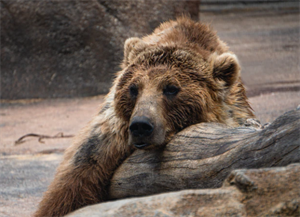
Sick bear
The doctor takes up his old medical books, probably because he had only been treating dogs, cats and other usual pet animals, and it was an unexpected situation to treat a bear that had consumed poison. The doctor consults the index of the medical book to find out the appropriate injection for Bruno. An index is a list of names or topics that are to be found in a book. It is a list arranged in alphabetical order at the end of a book, which is why he repeats the letter B to himself in an effort to trace the chemical's name and antidote easily. He comes across other words like barium salts and finally finds it, upon which he skims through the symptoms, effects and treatment and comes across the injection that he has to use to cure him. He rushes to get it, whilst Bruno's condition keeps worsening showing symptoms like vomiting, heavy breathing, his body becoming heavy and his mouth opening wide.
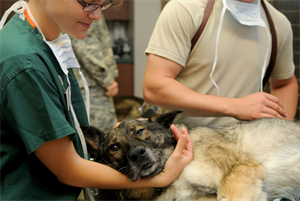
A vet treating a dog
As people held on to him, the injection is filled with medicine and is given to him. First, he is injected 10cc of the medicine. The cc refers to cubic centimetre in which the medicine is measured. But since he does not respond to it, another 10cc is injected. After ten minutes, his breathing becomes normal, and he could move his hands in a considerably better way. After thirty minutes, he wakes up, stands and walks with his legs, as though nothing bad had happened. He gives a casual look to the narrator, showing he was very brave to face through the hardships. He does not refrain from eating as he is not threatened by the fact that he was put in this condition, only because of not thinking before eating. He has a lavish meal, returning back to normalcy.
He recounts another incident where Bruno had gulped down one gallon of engine oil. The narrator had drained it from the engine of his Studebaker car. He had kept it aside for the purpose of escaping the termites that were attacking him. Termites generally attack the basement or other wooden areas in the house that are mostly untouched. The author wanted to use engine oil, because the oil would reduce the taste of the wood for the termites, thereby reducing their attack. Bruno had the least effect after drinking it. He casually walked and played and was his normal self, making him a cute little bear who loved to eat, drink and make merry.

Studebaker car
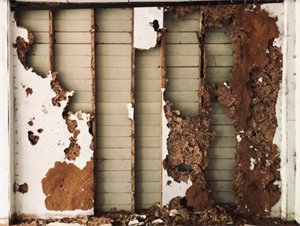
Termites attacking wood
The narrator flash forwards to many months later, when Bruno had grown in size, equalling the same height as the Alsatian dogs. He had even grown bigger than them in size. He emphasizes that Bruno had only grown in size, but his childish nature remained the same. He plays pranks and games just like his younger self. The love and bond between the narrator's wife and Bruno kept increasing as well. His wife changes his name from Bruno to a much more Indian name 'Baba', showing their connection to India, in spite of being British. 'Baba' meant 'small boy', which is an irony because the name was changed only when he had grown considerably in size. The name applies to his nature and not his outer appearance.
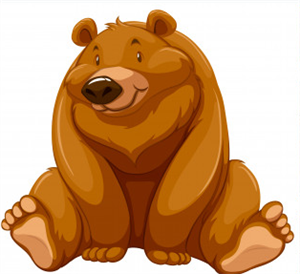
A fully grown bear
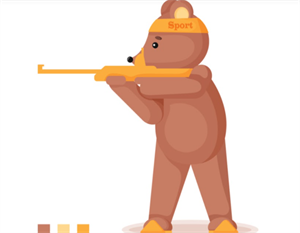
Bear pointing a gun
Bruno had to be kept chained because of the tenant's children. The same Bruno, who as a cub was not a threat to the children, suddenly poses a threat because of his size and growth. The narrator and his son advice his wife for the same reason, to send Bruno to a zoo. His grown size was beginning to bother the house. He was getting hard to maintain inside the house. They somehow convince the wife to send the bear to the zoo in Mysore. The narrator quickly writes a letter to the curator of the zoo, who manages the zoo's animal collection, as he did not want his wife to change his mind. The curator was more than happy to take a tamed bear into the zoo, and a lorry was sent from the zoo, a distance of eighty-seven miles to take him.
Although the narrator missed the bear, he was actually relieved that he no longer has to be cautious or take care of a grown bear. But his wife did not have the same feelings. She cried and went without food for days, as she missed him like his own son. When she writes to the curator to check on the bear, he writes back, saying that the bear was almost in a similar position to her. He avoided food and was seemingly unhappy. The fact that the bear who had once eaten everything including barium carbonate, and engine oil, was now refusing food, gives a clear picture of the unhappiness that the change in environment had brought to him.

Crying wife writes to the zoo
The narrator's wife missed the bear intensely that she was not satisfied by the letter sent by the curator that he was doing well. Therefore they urged and begged all their friends who were going to Mysore, on their personal work, to check on Bruno. Everyone reported the same way that he was doing good, but was fretting and not being his happy self. He had also become thin due to excessive worrying. The narrator somehow manages to console his wife and keep her from visiting the zoo. But he could not restrain her for so long. She never forgot Bruno, and therefore she insists on the narrator taking her to the zoo. She is also stubborn to the extent that she boldly tells him that, she would leave by the next train if he does not take her in the car. She does not mind struggling a bit to see her beloved Bruno. The narrator is left with little choice and therefore takes her to the zoo.

Man travelling along with his wife
Since it had already been months, after Bruno was taken to the zoo, the narrator and his friends predicted that he might not recognize her. They probably felt that way, since Bruno was an animal, and even humans grow apart, when in the distance. But the straight opposite was witnessed in the zoo. He recognized her even from a distance and howled with happiness. He had not forgotten her at all, in spite of months passing by. The narrator's wife ran up to him and petted him through the bars. The bear was so happy that he actually stood on his head (Upside down). An emotional reunion takes place in the zoo between the old mistress and her pet.
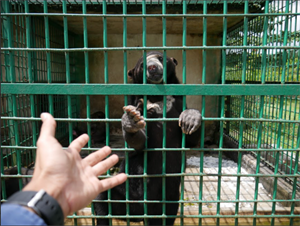
Bear reuniting with woman
She did not want to miss even a second with her beloved bear, and does not even move from the cage. She acts in a way a mother would when she visits her son, who stays in a hostel. She takes all his favourite items like chocolates, ice- creams, lemonades, tea and cake. She spent the day with him until it was closing time and they were in a desperate situation to extend their time with each other. But unfortunately for them, it was time to leave and they could not control their emotions. Both the wife and the bear cried bitterly. The curators and the keepers who are generally hardened and drained of emotions, because of working with animals in the zoo, were also depressed.
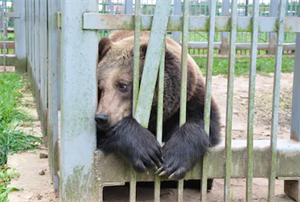
Depressed bear
The narrator, who witnesses all these scenes, explains that he knew what was in stock for him. He knew his wife well enough to know that his wife would not have the mindset to go back home after this emotional re-union. His wife asks the curator if she could take her bear back with her. The curator who was already in a depressed mood, after witnessing her plight, understands her situation. He tells her that since the bear was in a zoo, which was a government property, he did not have the rights to do so. But he gives her a relief as he says he might help her if the superintendent who resides in Bangalore agrees to her request.
They immediately return to Bangalore, in a hope to convince the curator's boss, the superintendent, to give the bear back to them. She pleaded with him with tearful eyes, as she could not bear to lose her beloved bear again. She appealed to him to give him back to her as both the animal and herself were worried and depressed by the separation. The superintendent understands that the bear shares a special bond with her, as she was the one who had taken care of him as a cub. He did not want to carry the guilt of separating the meek animal from his caretaker. He also realizes that the bear was tamed and there was no visible threat to anyone in letting him go. He was kind hearted and sent a letter to the curator asking him to allow her to spend around three hours next to his cage, to shower him with all the love that he had missed in the days of separation. He also orders for a cage to transport him from the zoo to the narrator's house.

Woman pleading with the superintendent
The narrator and his wife finally convince the superintendent to give them the bear back and he is brought home in a lorry. Things were getting ready for him to stay comfortably. The reason for sending him to the zoo was that he had grown in size and might pose as a threat to the neighbourhood. This time, they take special care for this not to be a hindrance for him staying with them. A group of workers were called and made to engage in making a special island for the bear. The island was spacious enough for him. It was twenty feet long, fifteen feet wide (Around six meters). To make it look more like an island, they made a dry pit filled with water which was only six feet wide and seven feet deep, so that it was not dangerous for the bear. It also acted as a small boundary between the human and the animal habitat.

Land surrounded by water
A wooden box served as his home in the island. It was once used as a shelter for the narrator's chickens and hens. It made him a warm shelter to sleep at night. They also add his old toys and favourite things, thereby making it nostalgic for the bear. Straw was placed inside the wooden box to make a warm bed for him. It is common for people to cherish material things of people whom they love when they are not around, since it contains a part of them. Similarly, the narrator's wife had missed the bear so much that she has securely preserved the bear's stick gun and wooden stump, which he considered as his 'baby'. They were put back in his new home to make him feel welcome.
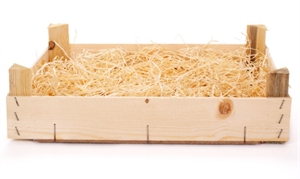
Wooden box with straw
The bear finally arrives in the island. Few workers from the zoo, bring him in a cage although it was unnecessary to have a cage for such a tamed bear. But when he reaches his home, he is so happy and understands that he no longer has to be lonely at the zoo and stands in his hind leg and plays with his gun. He points the stick gun at people exactly how he had done before leaving the house. He even cradles the wooden stump as his baby, showing that in spite of being away from home for months together, he had not forgotten a single thing and had treasured his memories. On contrary to the popular belief that animals do not have feelings or memory, he exerts great love towards his former owners. The narrator's wife is relieved that he is back and still considers him as her own baby. She sits beside him in the island in a chair and sometimes makes him sit on her lap in spite of him being very heavy. He was fifteen months old and was way beyond the stage of sitting in a human's lap. But love can oversee pain and discomfort and the narrator's wife plays the role of a mother who cannot have enough of getting her son back.

Happy bear standing on hind legs
She enters the island in an interesting way. Since the distance between the island and the home is only six feet, which is short, the narrator ties a rope to a mango tree within the premises and makes a loop at the end of it. She holds onto the rope, puts one foot on the loop and gives a push with her other foot, so it takes her to the island. It is easy for her to visit her beloved, which takes only a moment. The narrator concludes from the story that even wild animals can be affectionate when brought in a suitable condition. He can learn to reciprocate the love showered to him. The bear does not forget anything or anyone from his old home when he goes to the zoo. He keeps them in his memories and cherishes them as his best, hence proving that an animal can be as loving and caring as a human can be. The bear is capable of individual choices and characteristics like love, which makes him unique.
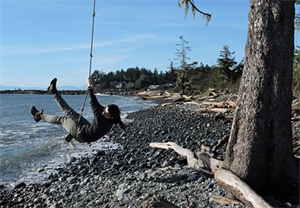
Woman swinging on a rope